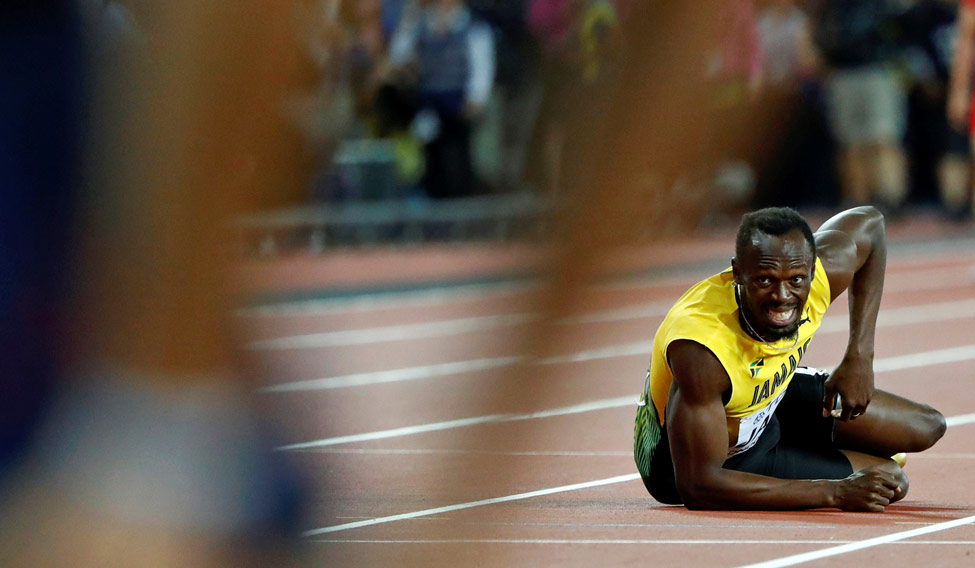The most charismatic and successful sprinter of all time, Usain Bolt’s career ended not with a bang but with a whimper at the 17th IAAF World Athletic championships in London. Injuries took a toll and on the same track in which he won three gold medals in the 2012 London Olympics (100 metres, 200 metres and 4x100 metres relay) he hobbled and tumbled to a halt, due to cramps in his left hamstring while anchoring Jamaica in the 4x100 metres final.
It was a sad end to the career of a man who has nine times run sub 9.77 seconds or faster for the 100 metres. In a way, his dejection and despair reminded me of Zinedine Zidane being sent off for head butting Marco Matterazzi (Italy) in the 2006 World Cup final in Berlin. It was Zidane’s last match and sadly, for many, the abiding memory of the French maestro is the head butt instead of his superlative skills in the 2006 World Cup. Sports, like life, is often cruel and unfair and so, in years to come, Bolt’s 11 gold medals in the World Championships may remain just a statistic. Instead, the image of Bolt, lying on his back in his lane, his head in his hands being tended by the medical staff is what may prevail.
The World Championships in London proved to be a bridge too far for Bolt—a bronze medal in the 100 metres and inability to finish the 4x100 metres relay race. He should have retired gracefully on a high after the 2016 Rio Olympics, when he won three gold medals. It is often said, it is best to retire when people ask why and not why not.
The 2017 World Athletic championships will be remembered for the eclipse of champions. Mo Farah’s aura of invincibility in long distance events also ended in his last major track race, the 5,000 metres final. The 34 year old British athlete’s bid for a fifth straight global 10,000/5,000 metres double was scuppered as he had to settle for the silver medal behind Ethiopia’s 23-year-old Muktar Edris.
In this race the Ethiopians showed that long distance races can be like a team event. The three Ethiopians in the final raced to a plan. Farah is known to cling to the front runners and finish strongly. The Ethiopians denied him his favourite tactic. At the bell, when Farah normally made his break he was boxed in by the trio of Ethiopians. Farah was weary after the gruelling 10,000 metres and could not produce his customary blistering finish. Still, Farah recovered to take the silver medal.
The 2017 London World Championships will also be remembered for the triumph of the sporting underdog and the emergence of new champions. USA, nine-time winners of the 4x100 metres relay, was pipped to the post by Great Britain. It was the first time Britain had won this race, much to the delight of the 56,000 spectators at London’s Olympic stadium.
The biggest upset in the women’s events came in the 3,000 metres steeplechase, where the USA ended Kenyan domination of this event. Emma Coburn took the lead in the final water jump and took the gold medal. Another American Courtney Frerichs finished second by outkicking Kenyan defending champion Hyvin Jekmiah in the sprint for the silver medal.
In another surprise, Azerbaijan-born Ruslan Guliev won the men’s 200 metres event, in a photo finish. Guliev who took Turkish citizenship in 2011, pipped the favourite Wayde van Nierkek at the finish line. For the first time in many years, there was no American or Jamaican sprinter among the medals in the men’s 200 metres, a sign of changing times. In the men’s 400 metres hurdles, a Norwegian Karsten Warholm won the gold medal, with the favourite Kerron Clement of USA getting the bronze medal. It was the first time a Norwegian man had won a gold medal in World Athletic championships. In the men’s 800 metres, a Frenchman, Pierre Amboise, who likes gambling in casinos, won an unexpected gold medal.
Still, some of old guard reigned supreme. American great Christian Taylor won the men’s triple jump for the third time. Dafne Schippers (Netherlands) retained her world 200 metres title. The tenacious Aussie Sally Pearson, recovering from hamstring injuries, overcame four Americans to win the 100 metres hurdles. The 39-year-old Yohgan Dinz of France, the father of two children, was the oldest gold medal winner claiming the 50km walk in 3 hours, 33 minutes and 12 seconds. The Russian, Maria Lasitskene, retained her high jump title and the bespectacled, tattooed Pawel Fajdek (Poland) won the men’s hammer throw for the third successive time.
Indian athletes disappointed even in fancied events like 4x400 metres relay for women and men, and in the 20km and 50km walk events. Davinder Singh Kang was the only Indian to enter the final of an event, but the javelin thrower finished a poor 12th, with a throw well below his personal best. When the new millennium started, Indian athletes like Neelam Jaswant Singh and Anju Bobby George won medals in the discus throw and triple jump at the World Championships. But that momentum has not been maintained and instead gone downhill. The large Indian squad at London disappointed with most of them not even achieving their personal best.






